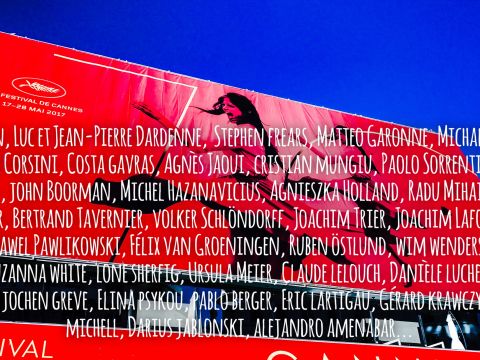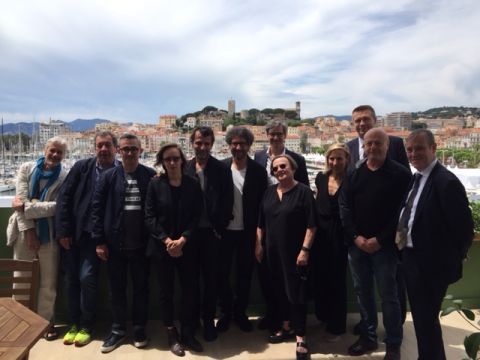Call of European Filmmakers - Festival de Cannes 2017
We, European citizens and filmmakers, live in a Europe that is a standard-bearer of hope when it remains faithful to its values of tolerance, open-mindedness and diversity and stands against the current trends towards nationalism, alternative facts and mistrust.
We believe that European filmmaking reflects Europe’s positive values. That it can inspire ambition and renewal in Europe’s cultural policies. Europe isn’t just jobs, territories, markets and consumers, European culture also supports multiple identities, democracy and freedom of expression.
Over the years, Europe and cinema have sometimes drifted apart; but they have also crossed paths. The support of European creation and distribution by the MEDIA Programme has been particularly important; its budgetary allocation must be reinforced and its range of action broadened, especially when it comes to authors.
Access to culture for all is an objective that is modern, economically strong, politically ambitious, technologically possible thanks to new digital technologies and, above all, human. The new digital landscape is one of opportunity. But the stakes are also high for creators themselves.
Guaranteeing sustainable financing and development of European filmmaking must be our priority.
More than ever, the territoriality of copyright needs to be maintained: this principle ensures high level support for artistic creation in Europe, helping the most fragile filmmakers and European co-productions. Enshrining this principle underwrites the exclusivity of rights and the financing of works. It is territoriality that has provided audiences with the great variety of films that are being financed all over Europe. While the dream of an EU single market can be enticing, such a project would undermine Europe’s cultural diversity.
The right for authors to be able to live from their art must be reinforced, so that they can keep on creating.
The European Parliament and Council are currently debating a draft Directive on Copyright. For all filmmakers, the European Union must ensure an equal level of protection across the continent, and acknowledge an inalienable right to remuneration when works are exploited online.
It must also encourage transparency and proportional remuneration linked to the success of films.
Bringing Internet giants into the economics of European creation is essential to the future of cinema.
Europe’s ambition must be to guarantee conditions for fair and sustainable competition between all those who make works available to European audiences. It must also defend the principle of fiscal equity and quickly implement measures on the financing and broadcasting of European works, that cannot be evaded. Finally, the place of taxation and place of broadcast of the works must be better aligned, as is already the case with VAT.
Europe is not a modern-day lawless wild west; it has to ensure the equal application of the rules to all broadcasters, platforms, sharing websites and social networks.
While piracy is still a scourge and lawful services struggle for viewers, it is necessary to promote a better visibility for films, on all formats.
We must speed up the development of film finding tools that cover all lawful services and also encourage cooperation between EU Members as well as existing initiatives.
All authors hope that their works will be accessible by as many people as possible; their works must be widely available on cinema screens, TV and its digital variants, and on all on-demand services.
Professionals will have to make an effort for this to happen. In addition, the European institutions, by creating quotas for the presence and promotion of European works for on-demand services, can establish a virtuous link between digital platforms and creators, without dismissing cultural diversity.
The task is not easy and the stakes are high: We need to unite political actors, creators and citizens so that we can rethink and rebuild an ambitious and rigorous cultural policy, tailored to new digital uses and economies, in such way that values the works of creators and puts those creators at the heart of future policies.
Fatih Akin (Germany / Allemagne)
Robert Alberdingk Thijm (Netherlands / Pays-Bas)
Alejandro Amenábar (Spain / Espagne)
Christophe Andréi (France)
Montxo Armendáriz (Spain / Espagne)
Clio Barnard (United Kingdom / Royaume-Uni)
Marco Bellocchio (Italy / Italie)
Lucas Belvaux (Belgium / Belgique)
Pablo Berger (Spain / Espagne)
Julie Bertuccelli (France)
Rok Biček (Slovenia / Slovénie)
Iciar Bollain (Spain / Espagne)
John Boorman (United Kingdom / Royaume-Uni)
Catherine Breillat (France)
Fred Breinersdorfer (Germany / Allemagne)
Miroslava Brezovská (Slovakia / Slovaquie)
Dominique Cabrera (France)
Peter Carpentier (Germany / Allemagne)
Marianna Čengel Solčanská (Slovakia / Slovaquie)
Carlos Clavijo (Spain / Espagne)
Dan Clifton (United Kingdom / Royaume-Uni)
Borja Cobeaga (Spain / Espagne)
Fernando Colomo (Spain / Espagne)
Stijn Coninx (Belgium / Belgique)
Emanuele Crialese (Italy / Italie)
Catherine Corsini (France)
José Luis Cuerda (Spain / Espagne)
Jean-Pierre Dardenne (Belgium / Belgique)
Luc Dardenne (Belgium / Belgique)
Dante Desarthe (France)
Leonardo Di Costanzo (Italy / Italie)
Fabrice Du Welz (Belgium / Belgique)
Klemen Dvornik (Slovenia / Slovénie)
Benedikt Erlingsson (Iceland / Islande)
Stephen Frears (United Kingdom / Royaume-Uni)
Matteo Garrone (Italy / Italie)
Costa Gavras (France)
Anne Georget (France)
Andrea Gibb (United Kingdom / Royaume-Uni)
Jochen Greve (Germany / Allemagne)
Michael Haneke (Austria / Autriche)
Michel Hazanavicius (France)
Miguel Hermoso (Spain / Espagne)
Olivia Hetreed (United Kingdom / Royaume-Uni)
Guy Hibbert (United Kingdom / Royaume-Uni)
Hrvoje Hribar (Croatia / Croatie)
Agnieszka Holland (Poland / Pologne)
Dariusz Jablonski (Poland / Pologne)
Agnès Jaoui (France)
Pierre Jolivet (France)
Jeanne Labrune (France)
Joachim Lafosse (Belgium / Belgique)
Line Langebek (United Kingdom / Royaume-Uni)
Eric Lartigau (France)
Claude Lelouch (France)
Marek Leščák (Slovakia / Slovaquie)
Zuzana Liová (Slovakia / Slovaquie)
Daniele Luchetti (Italy / Italie)
Miloslav Luther (Slovakia / Slovaquie)
Ole Christian Madsen (Denmark / Danemark)
Ursula Meier (France-Switzerland / France-Suisse)
Roger Michell (United Kingdom / Royaume-Uni)
Radu Mihaileanu (France)
Catalin Mitulescu (Romania / Roumanie)
Cristian Mungiu (Romania / Roumanie)
Olivier Nakache (France)
Michel Ocelot (France)
Annette K. Olesen (Denmark / Danemark)
Phil O'Shea (United Kingdom / Royaume-Uni)
Ruben Östlund (Sweden / Suède)
Sir Alan Parker (United Kingdom / Royaume-Uni)
Paweł Pawlikowski (Poland / Pologne)
Raoul Peck (France)
Sverre Pedersen (Norway / Norvège)
Adela Peeva (Bulgaria / Bulgarie)
Nicolas Philibert (France)
Ventura Pons (Spain / Espagne)
Corneliu Porumboiu (Romania / Roumanie)
Elina Psykou (Greece / Grèce)
Marián Puobiš (Slovakia / Slovaquie)
Di Redmond (United Kingdom / Royaume-Uni)
Gail Renard (United Kingdom / Royaume-Uni)
Jaime Rosales (Spain / Espagne)
Michaël R. Roskam (Belgium / Belgique)
Lone Scherfig (Denmark / Danemark)
Volker Schlöndorff (Germany / Allemagne)
Céline Sciamma (France)
Maurizio Sciarra (Italy / Italie)
Jerzy Skolimowski (Poland / Pologne)
Marko Škop (Slovakia / Slovaquie)
Paolo Sorrentino (Italy / Italie)
Birgitte Staermose (Denmark / Danemark)
Hugh Stoddart (United Kingdom / Royaume-Uni)
Charles Sturridge (United Kingdom / Royaume-Uni)
Ondrej Šulaj (Slovakia / Slovaquie)
Bertrand Tavernier (France)
Danièle Thompson (France)
Eric Tolédano (France)
Dušan Trančík (Slovakia / Slovaquie)
Joachim Trier (Norway / Norvège)
Fernando Trueba (Spain / Espagne)
Felix Van Groeningen (Belgium / Belgique)
Enrique Urbizu (Spain / Espagne)
Wim Wenders (Germany / Allemagne)
Susanna White (United Kingdom / Royaume-Uni)
Virginia Yague (Spain / Espagne)
Press officers :
Pauline Durand-Vialle : pdv@filmdirectors.eu
Marc Legrand : mlegrand@larp.fr
Agnès Mazet : agnes.mazet@sacd.fr
James Taylor : j.taylor@saa-authors.eu
#Cannes2017
#EUfilmmakers
#cinéma


